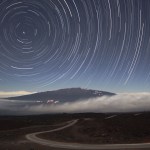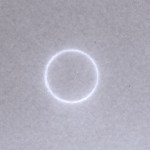eclipses
"Nature is relentless and unchangeable, and it is indifferent as to whether its hidden reasons and actions are understandable to man or not." -Galileo Galilei
All of science is rooted in the idea that natural phenomena can be explained naturally, and that if we want to know how anything in the Universe works, all we need to do is ask the Universe the right questions, and the answers will appear.
So what about the question of the night sky, and why it appears to rotate the way it does?
Image credit: Peter Michaud (Gemini Observatory), AURA, NSF.
There are two straightforward…
"The moon shuts off the beams of the sun as it passes across it, and darkens so much of the earth as the breadth of the blue-eyed moon amounts to." -Empedocles, ~450 B.C.
Less than two weeks ago, I saw my first annular eclipse, with some spectacular results at the moment of maximum eclipse.
From my first eclipse expedition, to False Klamath Cove, on the coast in northern California.
This happens, of course, because -- from our point of view -- the Moon appears to pass in front of the Sun, blocking a fraction of the light coming from it.
Image credit: NASA / Solar Dynamics Observatory.
And…
The buzz in the geoblogosphere this week has been about an article in Nature Geoscience on the status of women in the academic earth sciences. I meant to review it here, but haven't had the oomph. Instead, you should join the discussion at All My Faults are Stress-Related, Ten Million Years of Solitude, and The Dynamic Earth. One point that hasn't been discussed much yet is that graduate school in the earth sciences is actually freakishly egalitarian - unlike other fields, we do not see large-scale gender fractionation between the master's and Ph.D. As a Ph.D. noncompleter I was…

